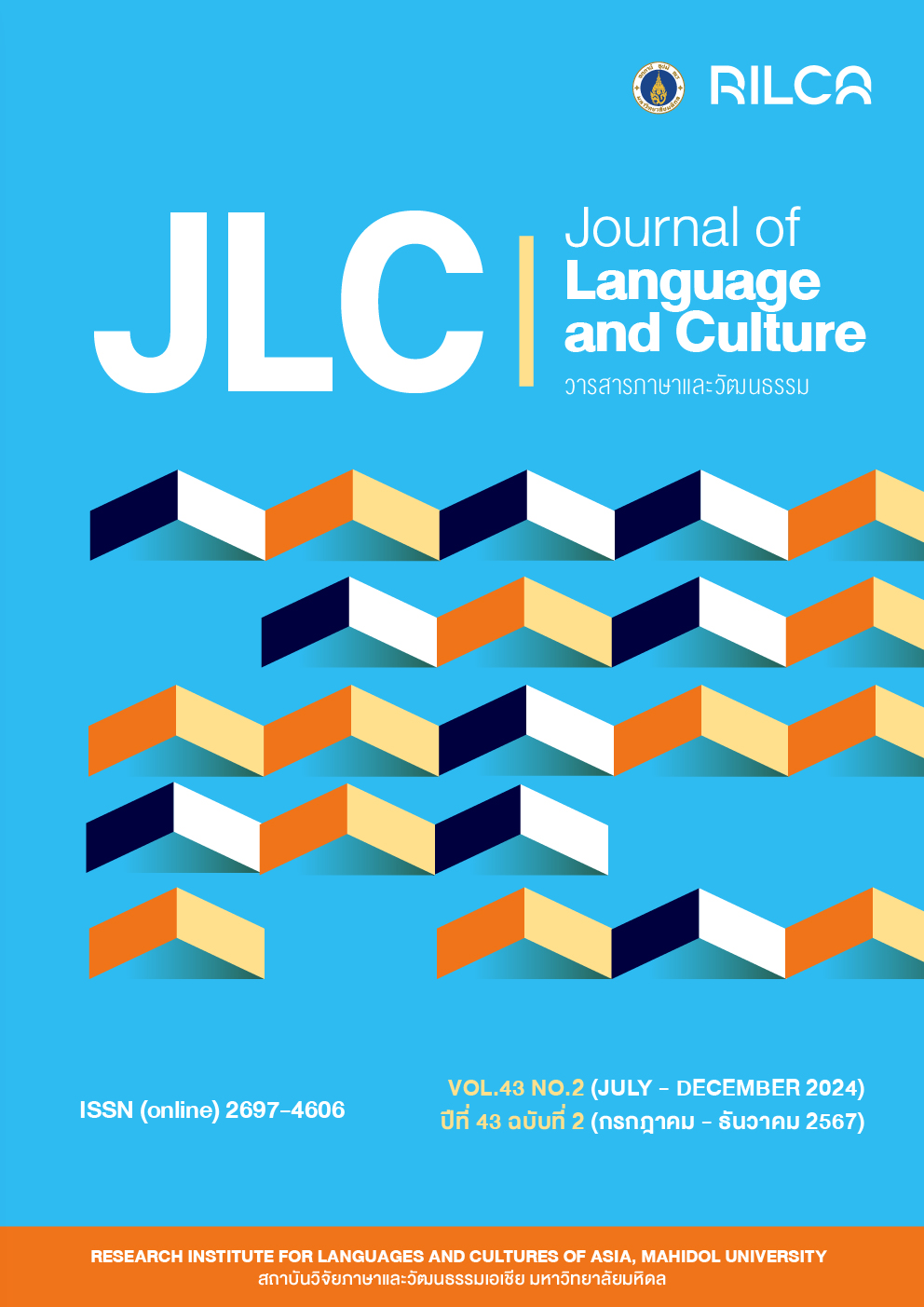When Bisexuality Becomes a Heteronormative Fantasy: Gender Bias in the Translation of The Trials of Apollo 1: The Hidden Oracle
Main Article Content
Abstract
While an ideal translation would be unbiased, achieving this is not always possible, as translations can reflect various biases held by translators, whether positive or negative. Translation is not a neutral process; it involves subjective choices made by translators, who may be influenced by their personal biases. Such biases, whether related to race, age, gender, or ethnicity, can appear in different forms, from subtle stereotypes and assumptions to explicit discrimination, affecting fairness and equity in both personal interactions and broader societal contexts. Against this backdrop, this article examines the gender bias present in the Thai translation of The Trials of Apollo 1: The Hidden Oracle, which centers on the main character depicted as bisexual. Through textual analysis, it will demonstrate how the main character’s bisexuality is straightwashed to align with heteronormativity in the target text. The focus will be on how the translator’s biased choices impact the portrayal of the character’s bisexuality in the Thai translation, as well as possible reasons behind this straightwashing.
Article Details

This work is licensed under a Creative Commons Attribution 4.0 International License.
The articles featured in the Journal of Language and Culture (JLC) constitute academic works representing the viewpoints of the respective author(s). It is crucial to note that these opinions do not necessarily reflect those of the Editorial Board.
All articles published in JLC are released under the Creative Commons Attribution 4.0 International License (CC BY 4.0). This license grants permission for unrestricted use, distribution, and reproduction in any medium, provided proper credit is given to the original author(s) and the source.
References
Abdelnasser, H., S. (2023). Gender bias in translation: A hermeneutic analysis of language manipulation between men and women. Egyptian Journals, 29(87), 1203-1220. https://doi.org/10.21608/AAKJ.2023.220101.1498
Baker, M. (2005). Contextualization in translator- and interpreter-mediated events. Journal of Pragmatics, 37(3), pp. 365-381. https://doi.org/10.1016/j.pragma.2004.08.006
Bassi, S. (2020). Sexuality. In M. Baker & G. Saldanha (Eds.), Routledge Encyclopedia of Translation Studies (pp. 522-526). Routledge.
Cambridge. (2024). Bias. In dictionary.cambridge.org. https://dictionary.cambridge.org/dictionary/
english/bias
Collins. (2024). Bias. In collinsdictionary.com. https://www.collinsdictionary.com/dictionary/
english/bias
Démont, M. (2018). On three modes of translating queer literary texts. In B. J. Baer & K. Kaindl (Eds.), Queering translation, translating the queer: Theory, practice, activism (pp. 157-171). Routledge.
Ghazala, H. (2002). The translator’ dilemma with bias. Babel, 48(2), 147-162. https://doi.org/
1075/babel.48.2.05gha
Lynch, D. (2023). Representation of bisexuality: An analysis of bisexual-identifying characters in Film [Undergraduate’s capstone, Elon University]. Elon.edu. https://www.elon.edu/u/
academics/communications/journal/archive/spring-2023/spring-2023-diana-lynch/
Melby, A. K., & Foster, C. (2010). Context in translation: Definition, access and teamwork. Translation & Interpreting, 2(2), 1-15. https://trans-int.org/index.php/transint/article/
view/87
Merriam-Webster. (2024). Constant companion. In merriam-webster.com. https://www.merriam-webster.com/dictionary/constant%20companion
Navarro, R. (n.d.). What is unconscious bias?. Office of Diversity and Outreach. https://diversity.ucsf.edu/programs-resources/training/unconscious-bias-training
Oxford. (2024). Bias. In oxfordlearnersdictionaries.com. https://www.oxfordlearnersdictionaries.com/
definition/english/bias_1?q=bias
Patel, R., & Pavlick, E. (2021). Was it “said” or was it “claimed”? How linguistic bias affects generative language models. In M.-F. Moens, X. Huang, L. Specia, & S. W.-t. Yih (Eds.), Proceedings of the 2021 Conference onEmpirical Methods in Natural Language Processing (pp. 10080–10095). Association for Computational Linguistics. https://paperswithcode.com/paper/was-it-stated-or-was-it-claimed-how
Recasens, M., Danescu-Niculescu-Mizil, C., & Jurafsky, D. (2013). Linguistic models for analyzing and detecting biased language. In H. Schütze, P. Fung, & M. Poesio (Eds.), Proceedings of the 51st Annual Meeting of the Association for Computational Linguistics (Volume 1: Long Papers) (pp. 1650–1659). Association for Computational Linguistics. https://aclanthology.org/P13-1162.pdf
Riordan, R. (2016). The trials of Apollo: The hidden oracle. Disney-Hyperion.
Riordan, R. (2017). The trials of Apollo: The hidden oracle (D. Chanchaiwanit, Trans.). (Original work published 2016).
Ruberg, B. (2018). Straightwashing Undertale: Video games and the limits of LGBTQ representation. Transformative Works and Cultures, 28. http://dx.doi.org/10.3983/twc.2018.1516
Santaemilia, J. (2018). Sexuality and translation as intimate partners? Toward a queer turn in rewriting identities and desires. In B. J. Baer & K. Kaindl (Eds.), Queering translation, translating the queer: Theory, practice, activism (pp. 11-25). Routledge.
Simo, H. I. A., & Ahmed, H. A. (2022). Bias in translation. International Journal of Health Sciences, 6(S4), 12250–12261. https://doi.org/10.53730/ijhs.v6nS4.11894
Smith, L. & Mitchell, H. (2024). What are straightwashing and ciswashing? The worrying trends undermining LGBTQ+ progress. PinkNews. https://www.thepinknews.com/2024/08/12/
what-is-straightwashing-gay-characters-hollywood-films-was-cole-porter-gay/
Wallett, H. (2023). What is bias in writing. Cascadia Author Services. https://cascadiaauthorservices.
com/
World Health Organization. (2006). Sexual health. https://www.who.int/health-topics/sexual-health#tab=tab_2
Wright, J. (2015). ‘Pride’ director calls straightwashing of DVD cover ‘clumsy’ but ‘valid’ marketing decision. Towleroad. https://www.towleroad.com/2015/01/pride-director-says-removal-of-gay-references-from-dvd-cover-was-clumsy-but-valid-marketing-decision/


